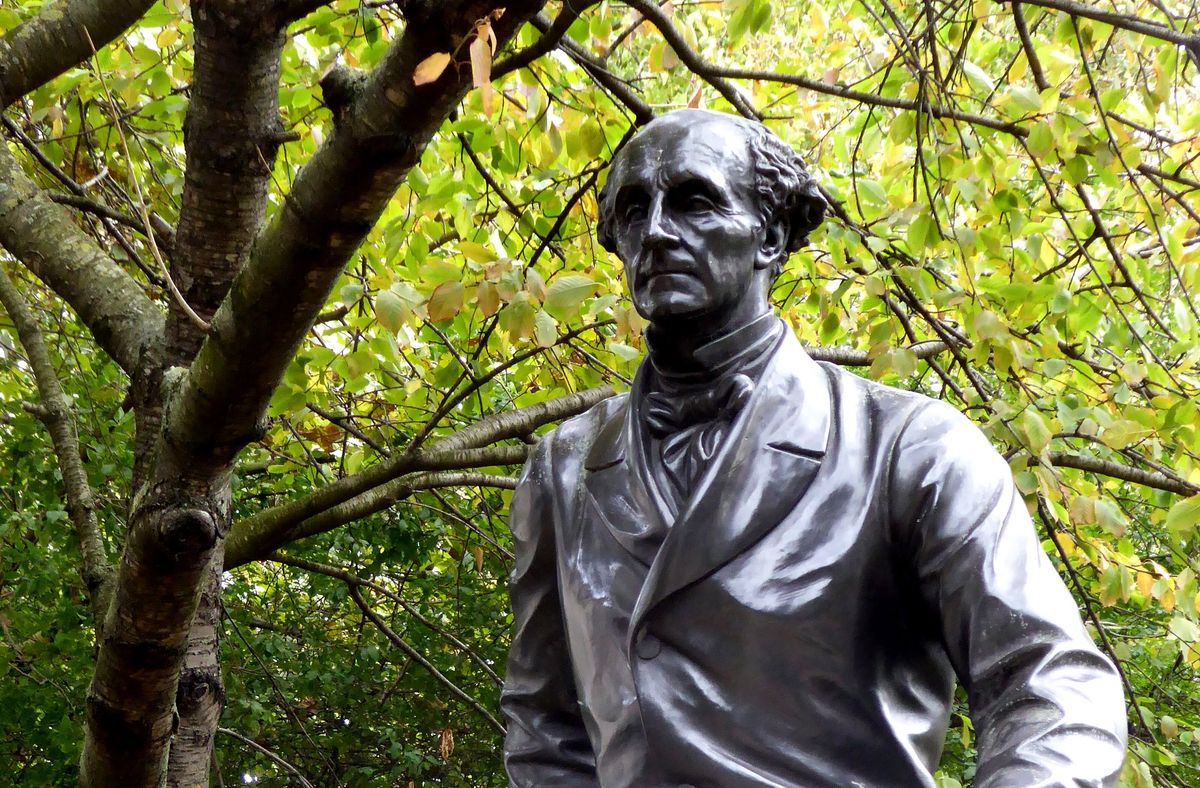From Utility to Liberty: The Case of John Stuart Mill

John Stuart Mill’s On Liberty stands as one of the pillars of modern liberal thought. It is embraced by libertarians and classical liberals for its elaboration of the “harm principle,” a seemingly significant constraint on government action. But there is also much in there for the progressive liberal. Often left out of libertarian discussions of On Liberty, Mill is explicit that his conception of “harm” that guides the harm principle includes a failure to provide assistance to those in need.[1] He also takes as his primary target not the authority of government but rather social authority, an issue libertarians are wont to ignore.
And yet, despite the canonical status of On Liberty, it is quite common to suggest that Mill’s explicit argument for the primacy of individual liberty and the harm principle is a failure. This is because Mill makes clear, from the outset, that he will not appeal to any “abstract right” of individual liberty (as a natural rights libertarian may) but rather ground the entire case for liberty on the principle of utility.[2] And it is now quite common to suggest that the principle of utility cannot ground the sort of strong commitment to individual liberty and political rights that define liberalism as a political philosophy.[3] Some even suggest that On Liberty represents Mill’s shift away from utilitarianism, or that the philosophy contained in that book is more properly attributed to Harriet Taylor Mill, perhaps even being actually authored by her and only published under Mill’s name because of the prejudices of the Victorian era.[4]
We should reject this pessimistic reading of Mill’s argument. Utilitarianism, especially the sort of utilitarianism actually advocated by Mill, not only provides sufficient grounds for liberalism but also provides a particularly attractive approach to justifying liberalism, an approach preferable to the deontological and contractarian approaches that dominate contemporary liberalism. Although making the full case for my view will require a lot of work, I want to focus here on establishing what I take to be the three main arguments Mill provides in On Liberty for deriving a liberal political theory from the principle of utility. And while I do not believe all of these arguments are as strong as Mill hoped, I do think they are generally suggestive of the right approach to justifying liberalism from a utilitarian perspective.
Mill’s principle of utility
Before jumping into the three arguments, it is important to make clear how Mill understands the principle of utility. I believe one of the major causes of the rejection of utilitarian liberalism comes from the sort of “Ethics 101” strawman version of utilitarianism that most people are familiar with, if they are familiar with utilitarianism at all.[5] But that version of utilitarianism was developed by its critics, not its proponents, and a careful examination of how the proponents understand the view provides a much more nuanced and interesting conception of utilitarianism.
In Utilitarianism, Mill first puts the “creed” this way: “actions are right in proportion as they tend to promote happiness, wrong as they tend to produce the reverse of happiness. By happiness is intended pleasure, and the absence of pain; by unhappiness, pain, and the privation of pleasure.”[6] He later develops the idea of pleasure or satisfaction by suggesting that there are two main parts of a satisfied life: tranquility and excitement. And so we should unpack his position by noting that actions are right to the degree they promote tranquility or excitement, and wrong to the degree they frustrate such things.
In On Liberty, Mill leans into the principle of utility as a principle of evaluating social institutions rather than individual actions. He adds that when he speaks of utility he means it “in the largest sense, grounded on the permanent interests of [humankind] as a progressive being.”[7] The notion of a progressive being is key here, since it ties in with Mill’s view that humans can always develop further and that the norms or standards of any given time are likely to be at least partly wrong. His optimism that we can always do better is central to his argument for liberty, and this optimism is unpacked further in Chapter 2 of Utilitarianism, where Mill introduces the idea of higher and lower pleasures and focuses heavily on the development of talents, especially a “cultivated mind” by which he means a mind “taught… to exercise its faculties.”[8] This is, according to Mill, a relatively low bar—he does not suggest that happiness is only open to the philosopher.
It is also worth noting that Mill doesn’t think the principle of utility should be a principle for individual actions. He suggests it is too abstract, but he also recognizes that people are likely to misapply it due to bias or lack of information. In Utilitarianism he offers a variety of indirect methods of application, such as acting in accord with common morality which he thinks, in many cases, is the evolutionary result of having tested various options to see which are most conducive to happiness. Like Bentham, he holds that the principle of utility is best used to evaluate existing rules, norms, and institutions as well as for deciding which new rules, norms, and institutions to adopt. In this way, the principle of utility is predominantly a principle of rational reflection rather than a guide to moral action. This is precisely how Mill aims to use the principle in On Liberty.
Experiments in living
At the core of Mill’s position in On Liberty is the idea that while the developed societies of his time had been reasonably successful in tossing off the shackles of government tyranny (by which he specifically meant despotic rule, not the mere presence of some liberty-reducing laws), they had yet to adequately deal with social tyranny—“the tyranny of the prevailing opinion and feeling… the tendency of society to impose, by other means than civil penalties, its own ideas and practices as rules of conduct on those who dissent from them.”[9] This is the tyranny that prevents people from fully developing as individuals, preventing them from being able to discover what truly makes them happy. Social tyranny demands conformity to existing ways of being, suppressing any attempts to engage in new “experiments in living.”
But for Mill it was essential that people be free to engage in experiments in living, and even be encouraged to do so. There are two main reasons that Mill provides for the value of experiments in living, and they are representative of the approach to justification Mill uses throughout On Liberty. The first reason is that individuals are somewhat unique, and so precisely what is conducive to their happiness will vary. Experiments in living are a means by which an individual works out what makes them happy. Part of the problem with social tyranny is that its drive for conformity denies individuals the opportunity to live their happiest life. Thus, for Mill, a society that permits a high degree of individual freedom will be a happier society insofar as everyone is left freer to figure out how to maximize their own happiness.
The second reason for permitting individuals to engage in experiments in living is that it is a form of social experimentation by which we collectively gather the data necessary to help us determine what generally is conducive to human happiness. While it is true that people are somewhat unique, and so it is unlikely that precisely the same endeavors will please everyone in the same way, we are not wholly unique. We can discover what the “best bets” are for human happiness, but to do so we need a lot of experimentation. This is part of what Mill means when he asserts that “[humankind] are greater gainers by suffering each other to live as seems good to themselves, than by compelling each to live as seems good to the rest.”[10] Free societies benefit from the individual freedom by learning what works and what doesn’t. This is the same sort of principle that underlies part of the justification for institutions like federalism—states and other smaller forms of government can function as “laboratories of democracy,” testing out ideas on a smaller scale so that if they fail, the harm is contained; but if they succeed, the success can propagate. It is noteworthy that both Mill’s “experiments in living” and Justice Brandeis’s “laboratories of democracy” have an explicit scientific/experimental flavor to them. For Mill, the good life could be investigated in much the same way scientists investigate the nature of electrons.
Wide latitude to engage in “experiments in living” are simultaneously good for the individual and good for society. This two-pronged approach to justification epitomizes Mill’s argumentative style. And it is, I believe, a sweet relief from some of the contractualist and deontological justifications for liberalism that tend to accept that respecting individual freedom will reduce the social good.
The best judge
Sitting at the foundation of the experiments in living argument is Mill’s claim that the individual is the “best judge” of her own happiness. Individual experiments in living are, in part, justified by the claim that happiness is largely a subjective matter and so we have little reason to believe that social conformity will produce happiness on an individual level. But the argument is deeper than this, and speaks to what I believe is a core insight of liberalism.
Mill’s claim is certainly not that the individual is always right about what is conducive to her own happiness. That is why contemporary arguments for the “nanny state” somewhat miss the mark due to their focus on cognitive bias as a way of concluding that individuals often fail to pursue what is in fact in their own interest. Instead, Mill suggests that the individual is more likely to get it right than government bureaucrats or random social thought leaders because the individual cares more about getting it right. By and large, no one cares more for an individual’s welfare than the individual themselves. Moreover, it is the individual who receives the punishment for getting it wrong. She receives the corrective feedback much more viscerally and immediately and has much more reason to want to course correct sooner rather than later.
This line of thinking can be found in many other liberals, especially classical liberals and libertarians, such as F.A. Hayek. Such thinkers often emphasize the lack of information and feedback that bureaucracies receive from their policies as a barrier to getting it right or course correcting. Put another way, social decisionmakers generally lack the proper incentives to truly want to get it right, and even if they are so motivated (despite the lack of incentives) they are likely to lack the information necessary to make the proper changes, or they receive the information much too slowly. Moreover, Mill and other liberals agree that when we empower society, either through government or through non-governmental means, to rule over individuals, there is a natural tendency to seek ever more power and control.[11] In short, centralized control over individuals is more apt to get it wrong, less apt to care about getting it wrong, and likely to abuse and expand any power it is given.
And this is why, according to Mill, “each [individual] is the proper guardian of [their] own health, whether bodily, or mental and spiritual.”[12] This argument leans heavily on the “good for the individual” half of Mill’s strategy, but also takes on the “good for society” part when combined with the discussion of experiments in living as well as Mill’s justification for freedom of speech in Chapter 2 of On Liberty.
Individuality and happiness
The final argument is perhaps the most interesting, insofar as it lends credence to the claims of critics who suggest that Mill isn’t really justifying liberalism by appealing to the principle of utility. He argues, throughout Chapter 3 of On Liberty, that “individuality” is a constituent part of human well-being. Put another way, he is suggesting that one cannot live a truly happy life unless one is choosing one’s life. But, the critic will say (and Mill wisely anticipates) “isn’t it possible that a caring person or society could guide another through life such that they experience only pleasure?” It does certainly seem in some sense possible. Yet Mill denies that this would constitute a genuinely happy (or good) life. As he puts it: “It is possible that he might be guided in some good path, and kept out of harm’s way… but what will be his comparative worth as a human being?”[13]
Recall that in Utilitarianism, Mill distinguishes between higher and lower pleasures and suggests that a truly happy life (for a human) must include “a cultivated mind,” by which he simply means humans must develop their higher faculties—their ability to reason and deliberate. If a person simply adopts a course of action without endorsing such a course themselves, then that will not “develop in him any of the qualities which are the distinctive endowment of a human being. The human faculties of perception, judgment, discriminative feeling, mental activity, and even moral preference, are exercised only in making a choice.”[14]
For Mill, then, failure to engage in rational reflection and to choose one’s pursuits—even if the choice one makes ends up being what is customary—means one is not engaging in activities that are generally conducive to human happiness. This is, in many ways, the same principle we (should?) use in raising children: in many cases we need to let them make a bad choice and learn from the failure, otherwise they will be stunted adults. So individuality is a ‘constituent of welfare’ not in the sense that it is something on top of happiness, but rather that it is essential to living a happy life. We may be able to achieve happiness in the moment by giving in to custom, but we will suffer for it in the long run.
But, once again, Mill does not solely focus on the good of the individual. Promoting individuality also reflects positively in society. For one thing, it is only through people choosing their own life paths that we get experiments in living, which we learn from. Relatedly, Mill suggests that “genius can only breathe freely in an atmosphere of freedom” and that geniuses are “more individual than any other people” and so any of the benefits we think society receives from the works of genius are the result of individuality.[15] More broadly, and once again harkening back to the experiments in living, moral and social progress is only possible if people are permitted to step outside the bounds of what is considered normal. So, in effect, Mill also rejects the practicality of imposing a happy life from above, for doing so requires that we know what the happy life for any given person is. But both because people are different and because we should not believe we have figured everything out just yet (or ever), any imposition from on high is more likely to miss the mark. Thus, Mill argues “the despotism of custom is everywhere the standing hindrance to human advancement, being in unceasing antagonism to that disposition to aim at something better than customary, which is called… progress or improvement.”[16]
A robust commitment to liberty
Mill’s commitment to liberty and equality is robust. And it is robust because of his utilitarianism, not in spite of it. A common problem for critics of utilitarianism, either as a moral or political principle, is to neglect the empirical emphasis of the view. Humans are fallible but capable of progress; they are individuals in the sense that they are not all made happy by the same circumstances or activities in the same way, they typically find pleasure in being their own person. For all these reasons, and more, commitment to the principle of utility is a commitment to substantial decentralization of decision-making and action. Utilitarianism for a god looks much different from utilitarianism for beings like us. As Jean-Jacques Rousseau keenly pointed out, when we are doing political philosophy we are interested in establishing institutions for humans, not angels. Thus, when we consider the application of the principle of utility to political institutions, we must do so with full consideration of our subjectivity, fallibility, and biases. And when we do that, as Mill did, we find ourselves with an important and, I believe, optimistic justification for individual liberty and liberal political institutions more broadly.
[1] John Stuart Mill, On Liberty 2nd edition. Chapter I, paragraph 11. Since there is no standard pagination for On Liberty, I’ll just refer to chapter and paragraph number.
[2] Ibid.
[3] Rawls, for instance, suggested that A Theory of Justice was predominantly aimed at supplanting utilitarianism as the dominant political philosophy of the time, and part of the argument of that book is that utilitarianism is insufficiently liberal.
[4] Mill did claim, in his autobiography, that he regarded Harriet as a joint author of most of his works, including On Liberty (and he dedicated the book to her starting with the 3rd edition, published after her death). But since Harriet also published her own work (even if sometimes anonymously) it seems a bit odd to suggest that she penned On Liberty only to have it published under John Stuart Mill’s name.
[5] It is interesting to note that, in Utilitarianism, Mill makes this exact same point about the understanding of utilitarianism in his time as well.
[6] John Stuart Mill, Utilitarianism 4th edition. Chapter 2. Similar to On Liberty, there is no standard pagination so I will refer to chapters.
[7] On Liberty chapter I, paragraph 11.
[8] Utilitarianism chapter 2.
[9] On Liberty, chapter I, paragraph 5
[10] On Liberty, chapter I, paragraph 13
[11] On Liberty chapter I, paragraph 15
[12] On Liberty chapter I, paragraph 13
[13] On Liberty chapter III, paragraph 4
[14] On Liberty chapter III, paragraph 3
[15] On Liberty chapter III, paragraph 11
[16] On Liberty chapter III, paragraph 17
Featured Image is Statue of John Stuart Mill on Victoria Embankment




